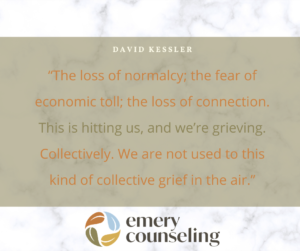It seems the world is filled with loss right now. I know many people are grieving big things, but some times it’s harder to acknowledge small losses. When so many have lost so much, it may not feel right to grieve things that have changed in our everyday lives. But these changes are significant and can affect us greatly.
David Kessler, the author of On Grief and Grieving: Finding the Meaning of Grief through Five Stages of Loss, was interviewed by the Harvard Business Review and commented, “The loss of normalcy; the fear of economic toll; the loss of connection. This is hitting us, and we’re grieving. Collectively. We are not used to this kind of collective grief in the air.”
 Things that we have taken for granted and have expected to be a part of our ongoing lives have disappeared.
Things that we have taken for granted and have expected to be a part of our ongoing lives have disappeared.
These can be as significant as canceled life events such as graduations, birthdays, weddings, and even funerals, to things that seem less severe such as our routines. The places we go, the things we do, and the people we see have all changed – these are all worthy of our grief.
Many of us have discovered that seemingly simple things hold a much deeper meaning than we’ve realized. For instance, work serves many functions, from social interaction to a sense of purpose to provide our livelihood. The systems we depend upon have been shaken. Healthcare, education, economic, and social networks have all been impacted. These can be just as significant as death but are more ambiguous, making it harder to recover from in the long run.
Robert Neimeyer, Ph.D. director of Portland Institute of Loss and Transition, says that we are all capable of losing “places, projects, possessions, professions, and protections.” All of which we can be powerfully attached to.
It can all seem so overwhelming; how can we survive? Two of the most important skills we can learn are reconstructing meaning around our loss and developing resiliency. J. William Worden, the author of Grief Counseling and Grief Therapy, suggests that when an unplanned or difficult loss occurs we need to redefine ourselves. We relearn ways to engage in the world without the thing we no longer have. We can never return to pre-loss status, but we learn to develop a meaningful life despite the differences.
 Resilience depends upon adaption rather than recovery. When we go through a loss, our hope is to recover the thing that we have lost. However, we must adapt to a world that is now different. By making a sound or effective adaption, we have demonstrated our resilience.
Resilience depends upon adaption rather than recovery. When we go through a loss, our hope is to recover the thing that we have lost. However, we must adapt to a world that is now different. By making a sound or effective adaption, we have demonstrated our resilience.
What are some practical ways that we can cope with loss? These are three things that can help us in the grieving process:
-
Name It and Claim It.
We may be ashamed to feel grief around everyday things we have lost, but the best thing we can do is to wrap language around it. Consider what you are losing. Remove the ambiguity surrounding your loss and express what it feels like to no longer have this as part of your life. One of the easiest ways to do this is by keeping a journal. Write about your emotional upheavals. Name what you’re losing – both individually and collectively. Then write about your personal strengths and coping skills. It can be helpful to write about previously challenging transitions, such as unemployment or divorce, and how you healed and recovered from those.
-
Social Support.
This may seem impossible right now, and our social isolation may be one of the things we are grieving. Still, it is more important than ever to connect with friends, family, and community. It can be hard to reach out these days, it can take some creativity to find ways to connect, but it’s likely that those around you are missing you just as much as you’re missing them. Find ways to keep your social network going – even if it is only virtually.
-
Find joy!
When we are grieving, it can seem impossible to find anything to be joyful about, however, there are small things and moments in every day that hold joy. Take the time to celebrate these things. Look to them to provide hope for tomorrow and as a bedrock to build new traditions, events, connections, and meaning. Ask yourself, “Even in the worst of times, what are the things we treasure?”
Jerry Hamill, Registered Psychotherapist


